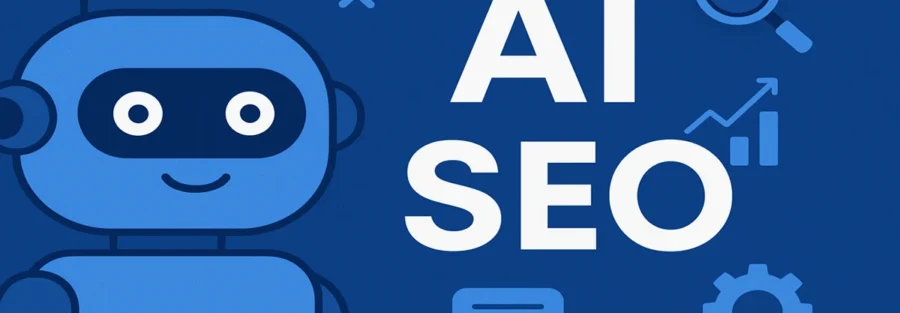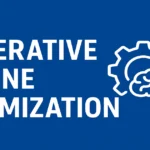Introduction:
Ever wondered why some sites rank so easily on the first page of Google and others don’t, even with fantastic content? The reason is the incorporation of AI SEO. With a marketplace where competition is high and algorithms are constantly changing, artificial intelligence is fast emerging as the best-kept secret of savvy marketers and content creators. If you have not yet investigated the potential of AI SEO to turbocharge your online marketing strategy, do it now.
Search Engine Optimization (SEO) has been the key to online success for years. Old-school SEO strategies such as keyword research, backlinks, and on-page optimization have worked for us. With AI, however, the game is changing fast. AI Intelligent SEO uses machine learning, natural language processing, and data analysis to automate and optimize SEO. This not only saves time but also improves the accuracy and effectiveness of your SEO work manifold.
In this complete guide, we will see what AI SEO is, why it’s important, its best features, and how actual brands are using it already to own search results. You’ll also discover practical steps on how to apply Intelligent SEO to your digital campaign. Let’s get started and crack the code to the future of search engine optimization.
What is AI SEO?
AI SEO, or Artificial Intelligence Search Engine Optimization, is the practice of incorporating artificial intelligence technologies into SEO methodology. It incorporates AI-powered algorithms and tools that can analyze data, forecast trends, optimize content, and enhance rankings more effectively than conventional methods.
Fundamental to Intelligent SEO is how it revolutionizes the way we undertake tasks such as keyword research, content production, on-page SEO, technical SEO, and backlink strategy. In traditional SEO, there is much manual intervention and reliance on human instincts. Intelligent SEO, however, brings automation, pattern detection, and decision-making capacity.
AI SEO incorporates the application of machine learning (ML) and natural language processing (NLP) to gain deeper insights into how users behave and search engine algorithms work. Google’s BERT and RankBrain, for instance, are AI components that enable the search engine to comprehend search query intent and context.
General tools in Intelligent SEO are Surfer SEO, Clearscope, MarketMuse, and Semrush’s AI capabilities. These tools provide real-time content improvement recommendations, keyword possibilities, competition insights, and predictive data analysis. They process large data sets fast and present content strategies that are founded on what is taking effect in your niche.
The use of AI in SEO also equates to more adaptive and personalized techniques. AI can track user behavioral patterns and respond accordingly to SEO techniques. From meta tag optimization to creating an entire blog structure, AI enhances SEO as faster, smarter, and more targeted.
In essence, AI SEO is not merely a fad—it’s an effective transformation of how digital marketers can better engage audiences.
Why AI SEO Matters
AI SEO is important because it deals with the bigness and complexity of today’s online marketing. The more that gets released onto the internet in a single day, and the more that Google alters its algorithms, the more remaining competitive equates to being intelligent. And AI is that intelligence.
For starters, Intelligent SEO enhances efficiency. Work that used to take hours—such as competitor research, keyword research, and technical checks—can be done within minutes. This leaves precious time for strategy and imagination.
Second, AI SEO enhances accuracy. Human error in keyword targeting, misreading analytics, or outdated tactics can cost rankings. AI algorithms analyze massive datasets with precision, identifying trends and gaps that humans might miss.
Third, Intelligent SEO enables personalization. Through monitoring of user behavior, AI technology is able to offer content and suggestions that ring truer with particular groups of people. This enhances the user experience and keeps people on your website longer, lowering bounce rates and enhancing interaction.
In addition to this, search engines themselves are making use of AI. Google’s application of machine learning in its content ranking ensures that only the most apt, contextually optimized content is victorious. When you align your SEO with AI, you’re speaking the language of the search engines.
Lastly, Intelligent SEO provides small and medium-sized businesses with a competitive advantage. With the proper tools, even modest marketing teams can create high-quality content that competes with major brands. It makes the playing field even and provides equal access to advanced SEO tactics.
Features of AI SEO
- Automated Keyword Research: AI SEO software can crawl thousands of pages, detect high-performing keywords, and provide variations considering search intent. This makes it easier to target long-tail and semantic keywords.
- Content Optimization: AI tools such as Surfer SEO and Clearscope provide real-time content grading and suggestions. They keep your content on par with top-ranking pages as well as optimized for readability and engagement.
- Competitor Analysis: AI is able to analyze competitor sites, compare their backlinks, keyword plans, and content organization. It determines what’s working for them and how you can beat them.
- Technical SEO Audits: Automated scans by AI tools on your website identify problems such as broken links, slow speeds, poor mobile user experience, and duplicate content.
- Natural Language Processing (NLP): NLP interprets content the same way a human would. It makes your pages contextually specific and semantically robust, which conforms to how Google consumes content.
- Predictive Analytics: AI SEO software predicts trends and recommends upcoming keywords or topics based on trends in data. This enables proactive content development instead of reactive.
- Content Generation: AI writing assistants aid in creating outlines, composing portions, or even entire articles based on insights derived from data, saving time and increasing productivity.
- User Intent Analysis: in AI determines what users are actually looking for, not just keywords, but user behavior and context, enabling more effective content alignment.
Case Studies: Actual Brands Leveraging AI SEO
1. HubSpot: HubSpot employs AI content optimization tools to keep up high rankings on competitive keywords. Their use of AI SEO tools assists in blogging content planning that is directly targeted to user intent.
2. Zillow: Zillow employs AI SEO to offer search results and property listings tailored to an individual’s preferences. Their AI tools enhance how listings display in search engines, resulting in higher visibility and engagement.
3. Grammarly: Grammarly uses AI to review content quality, but also uses Intelligent SEO to optimize its blog articles and landing pages for writing-related search terms.
4. Shopify: Shopify utilizes AI SEO to track technical health on merchant sites, recommending repairs that enhance search engine performance on its own.
5. Neil Patel Digital: Neil Patel’s agency employs a set of Intelligent SEO tools, such as Ubersuggest, which uses AI to provide keyword ideas, backlink opportunities, and content suggestions.
These companies prove that Intelligent SEO is more than a fad—it produces tangible results.
How to Use AI SEO
- Select the Correct Tools: Begin with AI SEO tools such as Surfer SEO, Semrush, or Jasper. These tools provide different amounts of automation, keyword analysis, and content optimization.
- Do Keyword Research: Leverage AI to explore keyword opportunities and user intent. Target clusters instead of singular keywords to align with semantic search.
- Optimize Content: Pass your content through AI tools that scan for readability, keyword frequency, and organization. Correct according to the recommendations to enhance rankings.
- Audit Your Site: Conduct an AI-powered technical audit. Fix any problems such as site speed, mobile compatibility, and internal linking architecture.
- Track and Adapt: Employ AI to track your performance indicators. Allow the tools to recommend changes or what to cover next according to changing trends.
- Experiment and Learn: Don’t leave experimentation to automation alone—apply AI insights to try new content types, publishing cadences, or outreach methods.
- Integrate Across Teams: Share Intelligent SEO insights across content creators, developers, and marketers so that they all work from the same data-driven playbook.
Conclusion
AI SEO is not the future of online marketing—it’s now. As search engines get smarter and users expect better content, leveraging artificial intelligence to drive your SEO efforts is no longer a choice. It enables marketers to produce improved content, optimize more quickly, and compete with the big boys in their industry.
No matter if you’re an enterprise or a small business, Intelligent SEO can be customized to fit your resources and ambitions. The technology is within reach, the returns quantifiable, and the benefits irrefutable. By embracing AI SEO today, you’re not merely keeping pace with the competition—you’re leaving it behind.
FAQs
Q1: Is Intelligent SEO ideal for beginners?
Yes, most Intelligent SEO tools are easy to use, and they are suitable even for beginners in SEO.
Q2: Does AI fully replace human SEO specialists?
No, AI is only augmenting SEO work, but human imagination, planning, and analytical mind are still required.
Q3: Are AI SEO tools costly?
There are free and paid tools, and that means companies of all sizes can take advantage of them.
Q4: How long will it take for me to see the results of AI SEO?
While processes are accelerated by AI, SEO results still require time, typically weeks to months, based on competition.Q5: What are some essential Intelligent SEO tools?
Surfer SEO, Semrush, Jasper, Clearscope, and MarketMuse are great places to begin with various aspects of Intelligent SEO.
Curious about smart transportation and digital growth? Head over to Digital Pracer’s blog and explore content that keeps you ahead of the curve!








